

Mindfulness. Mindfulness (Pali: sati,[1] Sanskrit: smṛti; also translated as awareness) is a spiritual or psychological faculty (indriya) that, according to the teaching of the Buddha, is of great importance in the path of enlightenment.
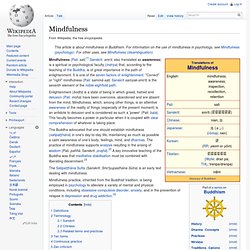
It is one of the seven factors of enlightenment. "Correct" or "right" mindfulness (Pali: sammā-sati, Sanskrit samyak-smṛti) is the seventh element of the noble eightfold path. The Buddha advocated that one should establish mindfulness (satipaṭṭhāna) in one's day-to-day life, maintaining as much as possible a calm awareness of one's body, feelings, mind, and dharmas. The practice of mindfulness supports analysis resulting in the arising of wisdom (Pali: paññā, Sanskrit: prajñā).[2] A key innovative teaching of the Buddha was that meditative stabilisation must be combined with liberating discernment.[3] The Satipaṭṭhāna Sutta (Sanskrit: Smṛtyupasthāna Sūtra) is an early text dealing with mindfulness. Definitions[edit] Dualism (philosophy of mind) René Descartes's illustration of dualism.
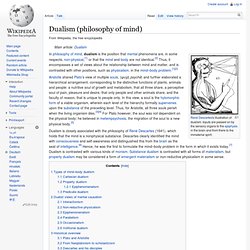
Inputs are passed on by the sensory organs to the epiphysis in the brain and from there to the immaterial spirit. In philosophy of mind, dualism is the position that mental phenomena are, in some respects, non-physical,[1] or that the mind and body are not identical.[2] Thus, it encompasses a set of views about the relationship between mind and matter, and is contrasted with other positions, such as physicalism, in the mind–body problem.[1][2] Ontological dualism makes dual commitments about the nature of existence as it relates to mind and matter, and can be divided into three different types:
Being and Mindfulness. The other night at a dinner party, a friend described how she tried to practice mindfulness meditation to keep herself from losing it during an utterly wretched seven-hour layover in an airport while she was exhausted, ill and desperate to get home to her children.

“I kept trying to be all ‘Be Here Now,’” she said, “but I just wanted to be anywhere but here.” We all laughed. Then she described how, on another day, she’d managed not to bite off the head of a woman who’d been gratuitously mean to her 8-year-old daughter, but instead had stayed in the moment and had connected and been able to join with the woman in an experience of their common, sadly limited, humanity. Where was the woman I always seek out at school events to laugh with? Where was the black humor, the sense of absurdity? I felt strangely abandoned. Meditation. Meditation is a practice in which an individual trains the mind or induces a mode of consciousness, either to realize some benefit[1] or as an end in itself.[2] The term meditation refers to a broad variety of practices (much like the term sports) that includes techniques designed to promote relaxation, build internal energy or life force (qi, ki, prana, etc.) and develop compassion,[3] love, patience, generosity and forgiveness.
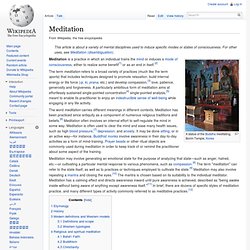
A particularly ambitious form of meditation aims at effortlessly sustained single-pointed concentration[4] single-pointed analysis,[5] meant to enable its practitioner to enjoy an indestructible sense of well-being while engaging in any life activity. Meditation may involve generating an emotional state for the purpose of analyzing that state—such as anger, hatred, etc. Etymology[edit] The English meditation is derived from the Latin meditatio, from a verb meditari, meaning "to think, contemplate, devise, ponder".[13] History[edit] Man Meditating in a Garden Setting. 1 of 5. How to Access Superconsciousness. 9 Mindfulness Rituals to Make Your Day Better. “Smile, breathe and go slowly.” - Thich Nhat Hanh, Zen Buddhist monk Post written by Leo Babauta.

Are you simply moving through your day, without fully living? I did this for many years. It was as if life were just passing by, and I was waiting for something to happen. I always felt like I was preparing for something later. But today isn’t preparation for tomorrow. Fully live today by being mindful. 2 of 5. How to Access Superconsciousness. 3 of 5. How to Access Superconsciousness. 4 of 5. How to Access Superconsciousness. 5 of 5. How to Access Superconsciousness. Mindfulness Meditation. Mindfulness Meditation Technique. Alan Watts - Guided Meditation (Awakening The Mind)
Learn how to meditate, guided meditation CDs, free audios, podcast, blog, instructions. Study shows mindfulness meditation reduces loneliness in older adults. Mindful. Planting Seeds: The Power of Mindfulness. An animated feature documentary film based on the book 'Planting Seeds: Practicing Mindfulness with Children by Thich Nhat Hanh & The Plum Village Community.

MAY 29th - June 5th Bonus! For any Donation over $100 You'll receive and extra "unsigned" Limited Edition Collectable Comic, Plus Your name will appear in the end credits of the film. We're also offering Limited Edition Collectable ****Donor Rewards (See Info Below) We actually need $214,500 to complete the film (see budget here), for the next 8 months of post-production work.
Thank you for spreading the word everyone who you think would support this project. MSNBC - How to Think About the Mind. How to Think About the MindNeuroscience shows that the 'soul' is the activity of the brain Sept. 27 issue - Every evening our eyes tell us that the sun sets, while we know that, in fact, the Earth is turning us away from it.
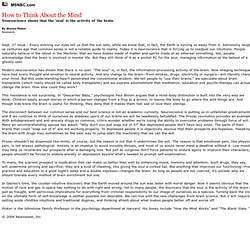
Astronomy taught us centuries ago that common sense is not a reliable guide to reality. Today it is neuroscience that is forcing us to readjust our intuitions. People naturally believe in the Ghost in the Machine: that we have bodies made of matter and spirits made of an ethereal something. Yes, people acknowledge that the brain is involved in mental life.
Modern neuroscience has shown that there is no user. This resistance is not surprising. The disconnect between our common sense and our best science is not an academic curiosity. » A Beautiful Method to Find Peace of Mind. Post written by Leo Babauta. Follow me on Twitter. How many times have you gotten upset because someone wasn’t doing their job, because your child isn’t behaving, because your partner or friend isn’t living up to his or her end of the bargain? How many times have you been irritated when someone doesn’t do things the way you’re used to? Or when you’ve planned something carefully and things didn’t go as you’d hoped? This kind of anger and irritation happens to all of us — it’s part of the human experience. One thing that irritates me is when people talk during a movie.
And it isn’t always easy to find peace when you’ve become upset or irritated. Let me let you in on a little secret to finding peace of mind: see the glass as already broken. Universal mind. Universal Mind is the universal higher consciousness or source of being in some forms of esoteric or New Thought and spiritual philosophy .
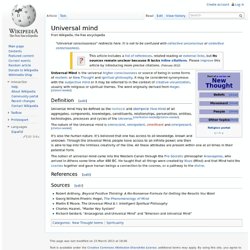
It may be considered synonymous with the subjective mind or it may be referred to in the context of creative visualization , usually with religious or spiritual themes. The word originally derived from Hegel . [ citation needed ] Definition [ edit ] Universal mind may be defined as the nonlocal and atemporal hive mind of all aggregates, components, knowledges, constituents, relationships, personalities, entities, technologies, processes and cycles of the Universe . [ clarification needed ] [ citation needed ] The nature of the Universal mind is omniscient , omnipotent , omnificent and omnipresent . [ citation needed ] It's also the human nature.
The notion of universal mind came into the Western Canon through the Pre-Socratic philosopher Anaxagoras , who arrived in Athens some time after 480 BC. References [ edit ] Georg Wilhelm Friedrich Hegel. The birthplace of Hegel in Stuttgart, which now houses The Hegel Museum Georg Wilhelm Friedrich Hegel (German: [ˈɡeɔɐ̯k ˈvɪlhɛlm ˈfʁiːdʁɪç ˈheːɡəl]; August 27, 1770 – November 14, 1831) was a German philosopher, and a major figure in German Idealism.
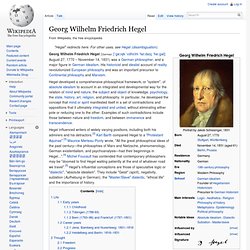
His historicist and idealist account of reality revolutionized European philosophy and was an important precursor to Continental philosophy and Marxism. Life[edit]